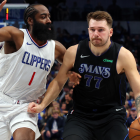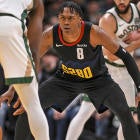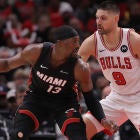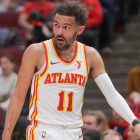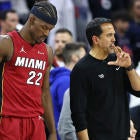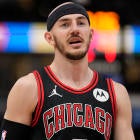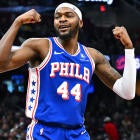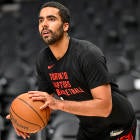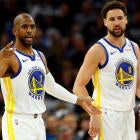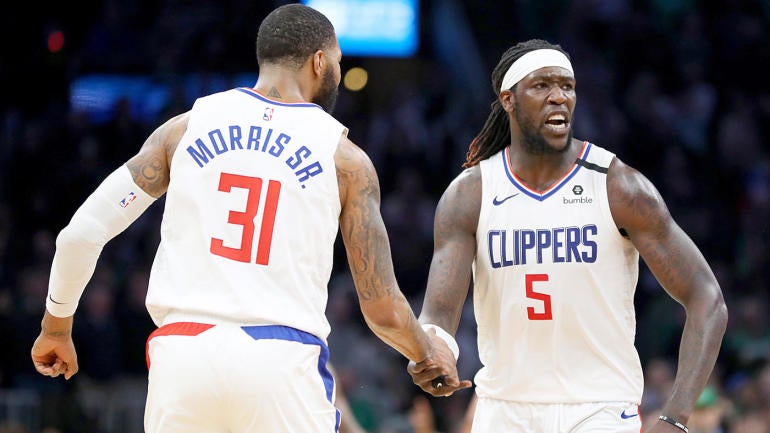
The two best teams may be focused on the NBA Finals right now, but the other 28 have turned their attention toward the offseason. While a schedule, a salary cap and a plan for next season are still getting sorted out, we can say that at some point in the fairly near future, free agency will begin and players will be able to move as they see fit.
But who is on the market? And what kinds of teams might be able to pursue them? Below is a list of every team's free agents this offseason and a brief look at how they might choose to go about building their rosters in the wake of the COVID-19 pandemic. Before we get started, a few brief notes:
- The assumption for now is that next season's cap numbers will be identical to this season's. That means a cap of $109.14 million, a luxury tax line of $132.627 million and an apron of $138.928 million. All of these numbers are subject to change. Some sort of cap compromise between the players and owners is forthcoming. This is just the likeliest one.
- While there are minor technical differences between team options and fully non-guaranteed contracts, they are considered identical for our purposes. The differences (usually related to guarantee dates), in most cases, don't warrant exploration.
- If a player is listed as both a team option and a restricted free agent, it means that declining that player's option would make him restricted rather than unrestricted. In most cases, though, declining an option or waiving a non-guaranteed player would make that player an unrestricted free agent.
- Using the non-taxpayer mid-level exception does not force teams to stay below the tax line. It hard-caps them at the apron.
Atlanta Hawks
- Unrestricted free agents: Jeff Teague, Vince Carter (retiring), Treveon Graham
- Restricted free agents: Skal Labissiere, Damian Jones, DeAndre' Bembry, Charlie Brown Jr.
- Player options: N/A
- Team options: Brandon Goodwin ($1.7 million)
- Partial guarantees: N/A
Atlanta can control the board in free agency. With virtually limitless cap space and no major pieces to re-sign, look for the Hawks to use their space aggressively. That might mean expensive contracts (particularly to restricted targets, as they have the space to wait out matching periods), or it could mean on the trade market. With so many teams in dire financial straits due to the coronavirus, Atlanta will be a valuable dumping ground for bad contracts, and the Hawks could cash in with draft picks if they so choose. Should they focus on immediate improvement, defense is the place to start.
Boston Celtics
- Unrestricted free agents: N/A
- Restricted free agents: Brad Wanamaker, Tremont Waters, Tacko Fall
- Player options: Gordon Hayward ($34.2 million), Enes Kanter ($5 million)
- Team options: Daniel Theis ($5 million), Semi Ojeleye ($1.7 million), Javonte Green ($1.7 million)
- Partial guarantees: N/A
Should Hayward opt in, Boston will start the offseason in luxury tax territory, thanks to Jaylen Brown's extension and their cavalcade of draft picks. That would portend a quieter offseason, with perhaps the usage of the taxpayer mid-level exception as their biggest external free-agency expenditure (though given their financial future, avoiding it outright next offseason may be the priority.) Watch for Boston to try to extend Hayward at a lower annual salary, though, as it would give him security and help get the team out of immediate tax territory. Either way, Boston will want to retain the bulk of its incumbent free agents. After the season the Celtics have had, why fix what isn't broken?
Brooklyn Nets
- Unrestricted free agents: Joe Harris, Wilson Chandler, Tyler Johnson, Henry Ellenson
- Restricted free agents: Chris Chiozza, Timothe Luwawu-Cabarrot, Jeremiah Martin
- Player options: N/A
- Team options: Garrett Temple ($5 million), Timothe Luwawu-Cabarrot ($1.7 million)
- Partial guarantees: N/A
Nets owner Joe Tsai can afford to pay the luxury tax, but will he want to? Without a track record, that is the question that defines Brooklyn's offseason. If money is no object, Harris and Temple will be backed, and they'll be joined by a valuable mid-level free agent. If not? Things get more complicated, especially if Brooklyn's trade aspirations are as ambitious as reports have suggested. The expectation should be that the Nets pay the tax, but how far above the line they're willing to go will be one of the biggest stories of the fall.
Charlotte Hornets
- Unrestricted free agents: Bismack Biyombo, Willy Hernangomez, Dwayne Bacon
- Restricted free agents: Robert Franks, Kobi Simmons, Ray Spalding
- Player options: Nicolas Batum ($27.1 million)
- Team options: Devonte' Graham ($1.7 million), Caleb Martin ($1.5 million), Jalen McDaniels ($1.5 million)
- Partial guarantees: N/A
Batum is almost certainly coming back, but even so, the Hornets can get to max cap space pretty easily. They won't need to. Star free agents tend not to go to Charlotte, and this class doesn't even have many to offer. But like Atlanta, Charlotte has the flexibility to cherry-pick needs or weaponize its cap room on the trade market. The Hornets still have a long way to go, but their flexibility is enviable in the current environment.
Chicago Bulls
- Unrestricted free agents: N/A
- Restricted free agents: Kris Dunn, Denzel Valentine, Shaquille Harrison, Adam Mokoka
- Player options: Otto Porter Jr. ($28.5 million)
- Team options: N/A
- Partial guarantees: N/A
With Porter probably picking up that option, the Bulls will be pressed up against the cap line. That's not the worst place for them to be in a year like this, though. They should be able to retain Dunn and use the full mid-level exception fairly comfortably. Billy Donovan took this job expecting to win. The Bulls still have a ways to go, but they can take a nice step in that direction with a strong offseason.
Cleveland Cavaliers
- Unrestricted free agents: Tristan Thompson, Matthew Dellavedova, Ante Zizic
- Restricted free agents: Alfonzo McKinnie, Tyler Cook, Matt Mooney, Levi Randolph
- Player options: Andre Drummond ($28.7 million)
- Team options: Jordan Bell ($1.8 million), Alfonzo McKinnie ($1.8 million), Dean Wade ($1.6 million)
- Partial guarantees: N/A
Cleveland traded its cap space for Drummond at the trade deadline, and will now likely operate as an above-the-cap team. That gives the Cavs the flexibility to retain Thompson using Bird Rights. A big one-year deal makes some sense. Thompson is a franchise icon and one of the last remaining pieces of the 2016 championship team, but young enough to cash in under normal circumstances. In a small sample, lineups featuring multiple big men work for the Cavs after the deadline, so without better options, keeping the gang together for another year is the simplest approach.
Dallas Mavericks
- Unrestricted free agents: Courtney Lee, J.J. Barea
- Restricted free agents: Antonius Cleveland, Josh Reaves
- Player options: Tim Hardaway Jr. ($19 million), Willie Cauley-Stein ($2.3 million)
- Team options: Michael Kidd-Gilchrist ($1.8 million)
- Partial guarantees: N/A
Dallas is hovering around the cap line as it is, but don't expect it to make any major long-term commitments this offseason. The Mavs can create max space pretty easily in 2021, when Giannis Antetokounmpo reaches free agency. That should limit them to one-year deals using the cap exceptions. Dallas will show off its characteristic ambition next offseason, but for now, the name of. the game is patience.
Denver Nuggets
- Unrestricted free agents: Paul Millsap, Mason Plumlee, Noah Vonleh
- Restricted free agents: Torrey Craig
- Player options: Jerami Grant ($9.3 million)
- Team options: P.J. Dozier ($1.8 million), Monte Morris ($1.7 million), Keita Bates-Diop ($1.7 million)
- Partial guarantees: N/A
Denver is roughly $31 million below the 2019-20 tax line, and its goal will be to retain as many of its free agents as possible without topping it. Grant's strong postseason will make that harder, but the others will likely struggle to find markets. Plumlee is probably the secondary priority unless the Nuggets are extremely confident in Bol Bol's short-term future. Millsap and Craig? That's up to the market, but Denver would prefer to keep both and run it back with a healthy Will Barton next season.
Detroit Pistons
- Unrestricted free agents: Brandon Knight, John Henson, Langston Galloway, Justin Patton, Jordan McRae, Christian Wood
- Restricted free agents: Thon Maker, Jordan Bone, Louis King
- Player options: Tony Snell ($12.2 million)
- Team options: Bruce Brown ($1.7 million), Svi Mykhailiuk ($1.7 million), Khyri Thomas ($1.7 million)
- Partial guarantees: N/A
The Pistons are the beneficiaries of Cleveland's Drummond bet, as his absence could help them create almost $40 million in cap space. Plenty of that should go to Wood, their breakout star, but they should also have enough earmarked to chase a young player of their choice. Given their lack of young star power, they don't need to be picky on positions. Detroit should still be in best-player-available mode, and given the lack of cap space around the league, it should have some nice options to choose from this offseason.
Golden State Warriors
- Unrestricted free agents: N/A
- Restricted free agents: Damion Lee
- Player options: N/A
- Team options: Ky Bowman ($1.5 million), Mychal Mulder ($1.5 million), Juan Toscano-Anderson ($1.5 million)
- Partial guarantees: Marquese Chriss ($1.8 million/$800,000), Damion Lee ($1.8 million/$600,000)
The D'Angelo Russell trade did far more than net the Warriors Andrew Wiggins and a draft pick. It also got Golden State out of the 2019-20 luxury tax, which in turn reset its repeater tax clock. That will prove absolutely critical to a Warriors team that gets the bulk of its revenue at the gate, thanks to an archaic local television deal. Golden State has always spent in the past, and will likely continue to do so now that the repeater tax is off the table for the time being. The tax payer-mid-level exception will be their primary tool in free agency, but also worth remembering is the $17 million trade exception they got by trading Andre Iguodala to Memphis last summer. They should be able to fit a very nice player into that slot.
Houston Rockets
- Unrestricted free agents: Bruno Caboclo, Tyson Chandler, DeMarre Carroll, Jeff Green, Thabo Sefolosha
- Restricted free agents: Michael Frazier, William Howard, Chris Clemons
- Player options: Austin Rivers ($2.4 million)
- Team options: Ben McLemore ($2.3 million), David Nwaba ($1.8 million), Chris Clemons ($1.5 million)
- Partial guarantees: N/A
The Rockets have some decisions to make. If they plan to keep their five most expensive players, James Harden, Russell Westbrook, Eric Gordon, PJ Tucker and Robert Covington, staying below the tax line while building any sort of depth would be virtually impossible. Expect Houston to explore a Gordon trade, and when that fails, look more seriously into dealing Covington or Tucker.
Indiana Pacers
- Unrestricted free agents: Justin Holliday, Jakarr Sampson
- Restricted free agents: Alize Johnson, Brian Bowen II, Naz Mitrou-Long
- Player options: N/A
- Team options: N/A
- Partial guarantees: T.J. McConnell ($3.8 million/$1 million)
The Pacers have some room below the tax line re-sign Holliday and perhaps use part of the MLE, but will they? The Pacers are always among the thriftier teams in the NBA, and owner Herb Simon is heavily invested in the mall business. Not a great industry to be in right now. If the Pacers keep this core together, don't expect any pricey additions.
Los Angeles Clippers
- Unrestricted free agents: Marcus Morris, Montrezl Harrell, Reggie Jackson, Patrick Patterson
- Restricted free agents: Johnathan Motley
- Player options: JaMychal Green ($5 million)
- Team options: Joakim Noah ($1.7 million)
- Partial guarantees: N/A
Cash flow is no issue for the Clippers, but flexibility might be. Any significant free-agent addition would cost the full mid-level exception. Using it would cost the Clippers either Morris or Harrell, if not both. The simplest approach would be to retain both, explore the trade market, and use the taxpayer mid-level exception for a smaller addition, but firing Doc Rivers was a signal. This won't be a quiet offseason from the Clippers.
Los Angeles Lakers
- Unrestricted free agents: Markieff Morris, Dion Waiters, Jared Dudley, JR Smith, Dwight Howard
- Restricted free agents: Kostas Antetokounmpo
- Player options: Anthony Davis ($28.8 million), Kentavious Caldwell-Pope ($8.5 million), Avery Bradley ($5 million), JaVale McGee ($4.2 million), Rajon Rondo ($2.6 million)
- Team options: N/A
- Partial guarantees: Quinn Cook ($3 million/$1 million)
Let's get the obvious out of the way: Davis will be back on a new max deal. Beyond that? This is a mess. The Lakers would probably prefer to use the full mid-level exception to make a significant addition this offseason, but there's no telling how much flexibility they'll have to do so. They don't know who will opt in or opt out, and they don't know which of the opt outs will stay. Several have the leverage to demand raises. Predicting much before the Finals would be premature, but expect some changes on next year's roster.
Memphis Grizzlies
- Unrestricted free agents: Josh Jackson, Anthony Tolliver
- Restricted free agents: De'Anthony Melton, Yuta Watanabe, John Konchar
- Player options: N/A
- Team options: Jontay Porter ($1.5 million)
- Partial guarantees: N/A
Memphis punted away its 2020 cap space at the deadline in exchange for Justise Winslow. The implication was that the Grizzlies plan to be aggressive in 2021, when a stronger free-agent class might yield a true difference-maker. If that is indeed the plan, expect the Grizzlies to make only minor additions this offseason.
Miami Heat
- Unrestricted free agents: Goran Dragic, Solomon Hill, Meyers Leonard, Jae Crowder, Udonis Haslem, Derrick Jones Jr.
- Restricted free agents: Kyle Alexander, Daryl Macon, Chris Silva, Gabe Vincent
- Player options: Kelly Olynyk ($12.2 million)
- Team options: Kendrick Nunn ($1.7 million), Duncan Robinson ($1.7 million)
- Partial guarantees: N/A
The Heat didn't even want to pay the tax when they had LeBron James. Odds are, they'd prefer not to during a pandemic. That gives them two options: Let all of their free agents walk and work with something like $30 million in cap space, or keep as many as possible while staying below the tax line. Considering their 2021 ambitions, doing so would mean signing players to big one-year deals. Dragic and Crowder might be amenable at their ages, but the younger Jones will probably seek out a longer-term deal.
Milwaukee Bucks
- Unrestricted free agents: Sterling Brown, Kyle Korver, Marvin Williams (retiring), Pat Connaughton
- Restricted free agents: Cameron Reynolds, Frank Mason
- Player options: Robin Lopez ($5 million), Wesley Matthews ($2.7 million)
- Team options: Ersan Ilyasova ($7 million)
- Partial guarantees: N/A
All indications suggest that the Bucks are willing to pay the tax this season in a last-ditch effort to retain Giannis Antetokounmpo. They're hovering around the line as it is, and any big additions in free agency or the trade market would push them over the top. Building a champion in Milwaukee will be pricey, but with Giannis' future on the line, it would be well worth it.
Minnesota Timberwolves
- Unrestricted free agents: Evan Turner
- Restricted free agents: Juancho Hernangomez, Malik Beasley, Jordan McLaughlin, Kelan Martin
- Player options: James Johnson ($16 million)
- Team options: Jarred Vanderbilt ($1.7 million), Jaylen Nowell ($1.5 million), Naz Reid ($1.5 million)
- Partial guarantees: N/A
When you factor in the No. 1 pick, the Timberwolves have no real way of creating immediate cap space, but they wouldn't have had much use for it anyway. This offseason will be about retention and consolidation. Re-signing the restricted free agents should take them close to the tax. Don't expect them to surpass it for any reason with a sale on the way.
New Orleans Pelicans
- Unrestricted free agents: Derrick Favors, E'Twaun Moore, Jahlil Okafor
- Restricted free agents: Brandon Ingram, Frank Jackson, Kenrich Williams, Josh Gray, Zylan Cheatham
- Player options: N/A
- Team options: Darius Miller ($7 million)
- Partial guarantees: N/A
A new deal for Ingram will swallow up their possible cap space, but the Pelicans still have plenty of room below the tax line to get creative. Retaining Favors and using the full MLE is not outside of the realm of possibility. Neither is a big trade. The Pelicans are still early in their rebuilding cycle. They can move in almost any direction they choose.
New York Knicks
- Unrestricted free agents: N/A
- Restricted free agents: Damyean Dotson, Jared Harper, Ivan Rabb
- Player options: N/A
- Team options: Bobby Portis ($15.8 million), Theo Pinson ($1.7 million), Mitchell Robinson ($1.7 million)
- Partial guarantees: Taj Gibson ($9.5 million/$1 million), Wayne Ellington ($8 million/$1 million), Elfrid Payton ($8 million/$1 million), Reggie Bullock ($4 million/$1 million)
The Knicks can, functionally speaking, create as much or as little cap space as they want. Gibson will likely remain as a standard-bearer of new coach Tom Thibodeau's culture, but the rest of the non-guarantees are likely out. Who the Knicks will pursue with their space is a mystery, but expect point guard to be the priority if it is not addressed in the NBA Draft.
Oklahoma City Thunder
- Unrestricted free agents: Danilo Gallinari, Andre Roberson, Nerlens Noel, Devon Hall
- Restricted free agents: Kevin Hervey
- Player options: Mike Muscala ($2.3 million)
- Team options: Abdel Nader ($1.8 million), Deonte Burton ($1.7 million), Hamidou Diallo ($1.7 million)
- Partial guarantees: N/A
The Thunder have been paying the tax for years now, but all indications suggest they plan to rebuild. That suits ownership just fine. With Gallinari likely headed out and Chris Paul probably getting traded, the Thunder should curb spending for the time being and focus on developing the young players already in the building.
Orlando Magic
- Unrestricted free agents: D.J. Augustin, Wes Iwundu, Michael Carter-Williams
- Restricted free agents: Gary Clark, B.J. Johnson, Vic Law, Josh Magette
- Player options: Evan Fournier ($17.2 million), James Ennis ($2.1 million)
- Team options: Melvin Frazier ($1.7 million)
- Partial guarantees: N/A
Don't expect Fournier to opt out unless it comes with an extension agreement. The Magic might not mind lowering Fournier's cap number on a longer commitment, but it isn't a necessity. For now, they remain comfortably below the tax line. Assuming they exercise caution this offseason, that is likely where they will remain.
Philadelphia 76ers
- Unrestricted free agents: Ryan Broekhoff, Alec Burks, Raul Neto, Kyle O'Quinn, Glenn Robinson III
- Restricted free agents: N/A
- Player options: N/A
- Team options: Furkan Korkmaz ($1.8 million), Norvel Pelle ($1.5 million)
- Partial guarantees: N/A
Ladies and gentlemen, meet the most expensive roster in basketball today. The 76ers have four players making at least $27.5 million next season. They will be aggressive, just not on the free-agent market. A sign-and-trade is all but impossible at their cap number, so the typical trade market, the draft, and the lower levels of free agency will be their pathways to improvement.
Phoenix Suns
- Unrestricted free agents: Aron Baynes
- Restricted free agents: Dario Saric, Jevon Carter, Tariq Owens
- Player options: N/A
- Team options: Frank Kaminsky ($5 million), Cameron Payne ($2 million), Cheick Diallo ($1.8 million), Elie Okobo ($1.7 million)
- Partial guarantees: N/A
The Suns can get to around $20 million in cap space if they let everyone go. Not bad, but if they plan to retain either Saric or Baynes as a long-term backup center, more moves will be necessary to clear out space. Ricky Rubio and Kelly Oubre Jr. stand out as movable pieces depending on the target.
Portland Trail Blazers
- Unrestricted free agents: Hassan Whiteside, Caleb Swanigan, Carmelo Anthony
- Restricted free agents: Wenyen Gabriel, Jaylen Hoard, Moses Brown
- Player options: Rodney Hood ($6 million), Mario Hezonja ($1.9 million)
- Team options: N/A
- Partial guarantees: Trevor Ariza ($12.8 million/$1.8 million)
Like Minnesota, a potential sale all but ensures that Portland won't pay the tax. If cost-cutting is a goal, the Blazers might need to choose between Ariza and a full mid-level free agent, especially if retaining Whiteside is at all a priority. Portland usually prefers to retain its own players, but it's hard to believe it couldn't do better than either with the full MLE at their disposal.
Sacramento Kings
- Unrestricted free agents: Kent Bazemore, Alex Len, Corey Brewer, Yogi Ferrell
- Restricted free agents: Bogdan Bogdanovic, DaQuan Jeffries
- Player options: Jabari Parker ($6.5 million)
- Team options: Nemanja Bjelica ($7.2 million)
- Partial guarantees: N/A
While Monte McNair's vision isn't quite clear yet, in all likelihood, Sacramento's two priorities will be retaining Bogdan Bogdanovic and remaining below the tax line. Neither should be particularly difficult, assuming the Kings are willing to make concessions elsewhere. The Kings might lose some depth, but unless they decide to make a major trade, the core should remain in place.
San Antonio Spurs
- Unrestricted free agents: Marco Belinelli, Bryn Forbes, Tyler Zeller
- Restricted free agents: Jakob Poeltl, Drew Eubanks, Quinndary Weatherspoon
- Player options: DeMar DeRozan ($27.8 million)
- Team options: Chimezie Metu ($1.7 million)
- Partial guarantees: Trey Lyles ($5.5 million/$1 million)
Assuming DeRozan opts in, a Poeltl extension probably takes the Spurs close to the tax line. That will mean limited spending elsewhere, and likely the release of Lyles. The youth movement is in full swing in San Antonio, and there is enough incumbent young talent to justify a quiet offseason.
Toronto Raptors
- Unrestricted free agents: Marc Gasol, Serge Ibaka, Fred VanVleet, Rondae Hollis-Jefferson
- Restricted free agents: Chris Boucher, Malcolm Miller, Oshae Brissett, Paul Watson
- Player options: Stanley Johnson ($3.8 million)
- Team options: Terence Davis ($1.5 million), Dewan Hernandez ($1.5 million)
- Partial guarantees: Matt Thomas ($1.5 million/$725,000)
Like the Heat, the Raptors will surely plan to limit multi-year commitments with Antetokounmpo's free agency looming. They'll do what it takes to keep VanVleet, but unless Gasol and Ibaka are willing to take fat one-year deals, both will likely explore the market. If the Raptors can keep all three and stay below the tax, this offseason will be a win.
Utah Jazz
- Unrestricted free agents: Jordan Clarkson, Emmanuel Mudiay
- Restricted free agents: Juwan Morgan, Rayjon Tucker, Jarrell Brantley, Justin Wright-Foreman
- Player options: Mike Conley ($34.5 million)
- Team options: Georges Niang ($1.8 million), Miye Oni ($1.5 million), Nigel Williams-Goss ($1.5 million)
- Partial guarantees: N/A
A new deal for Clarkson would probably take the Jazz close enough to the tax line that the full mid-level exception would be out of the question. Given their bench struggles, that's an issue. A possible solution might involve offering Conley an extension that lowers his cap number, but given his underwhelming first season with the Jazz, does committing long-term money to him seem like the best idea? The Jazz will probably make the best of a bad situation and run it back next season.
Washington Wizards
- Unrestricted free agents: Ian Mahinmi, Davis Bertans, CJ Miles, Shabazz Napier, Gary Payton II
- Restricted free agents: Johnathan Williams, Garrison Mathews, Anzejs Pasecniks
- Player options: N/A
- Team options: Isaac Bonga ($1.7 million)
- Partial guarantees: Anzejs Pasecniks ($1.5 million/$250,000)
The Wizards are in a holding pattern until they know just how productive John Wall can be after an Achilles tear. They'll pay up to keep Davis Bertans, but beyond that, big moves are unlikely. The Wizards will pick a direction once they have a better idea of what sort of Wall they're getting moving forward.














